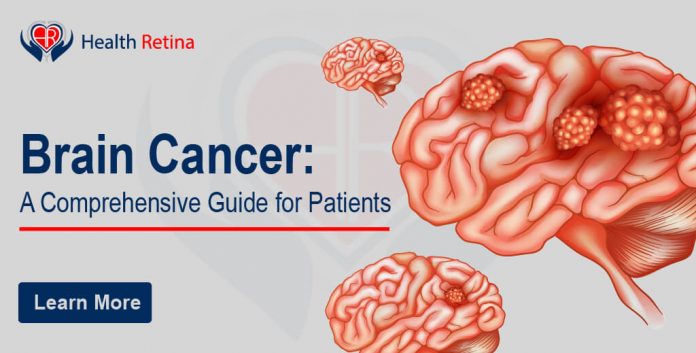What is brain cancer?
Systems of brain cancer are masses of brain tissue that are caused by an overgrowth of brain cells, which is known as primary brain cancer. Brain cancer that has metastasized from another part of the body is also referred to as secondary brain cancer. Breast, colon, kidney, lung, and skin cancers are among the cancers that are frequently known to spread to the brain.
What Causes Brain Cancer?
Brain cancer develops when cells alter their DNA, instructing them to multiply quickly and live on instead of dying off according to their natural life cycle. A tumor is a mass of extra cells that have accumulated as a result of this. The exact cause of primary cancer is still unknown to medical professionals, and for the majority of patients, a brain tumor’s origin is never determined.
Brain Cancer Symptoms
The types of symptoms patients will experience are influenced by the size of a tumor and its rate of growth. Different regions of the brain control various bodily functions, so specific symptoms are more likely to manifest depending on the tumor’s location. The following is a list of the most typical signs of brain cancer Brain cancer symptoms can vary depending on the type of brain tumor, its location, size, and growth rate. Typical signs of brain cancer include:
Headaches: Recurrent, excruciating headaches that could get worse over time, particularly in the morning or when coughing or bending over.
Seizures: irregular brain electrical activity that can cause seizures, convulsions, or strange movements.
Vomiting and nausea: These symptoms frequently strike without warning and may get worse over time.
Vision changes: vision that is hazy or doubled over, has some vision lost, or is affected by flashing lights.
Weakness or paralysis: gradual onset of numbness or weakness in a single body part. It may make it difficult to walk or carry out daily tasks.
Speech difficulties: Slurred speech, difficulty finding the right words, or difficulty speaking.
Cognitive changes: Memory issues, mental confusion, attention issues, or personality changes.
Balance and coordination problems: a lack of coordination, stumbling, and balance issues.
Changes in mood or behavior: irritability, mood swings, and instability of emotions.
Unexpected weight gain or loss: Unexpected weight changes without a known cause.
It is important to remember that several other medical conditions that are unrelated to brain cancer can also cause these symptoms. To identify the underlying cause and receive the proper care, you or someone you know should see a doctor right away if they have persistent or severe symptoms. Patients with brain cancer can significantly improve their prognosis with early detection and treatment.
Diagnosis
A diagnosis can be made using a variety of tests; the following are some of the most popular tests:
Neurological Exam: A series of tests to gauge the patient’s reflexes, balance, hearing, and vision.
Brain Scans: To pinpoint the tumor’s location, this may involve CT scans, MRIs, X-rays, or PET scans.
Biopsy: A surgical procedure in which the doctor takes a small sample of tumor tissue for analysis. They can use this to determine the tumor’s aggressiveness and cancerousness. If surgery is not an option, a stereotactic needle biopsy may be used. A tiny hole is made in the skull at this point, and tissue from the tumor is removed with a thin needle for testing.
Lumbar Puncture: Take a sample of the cerebrospinal fluid to check for the presence of any tumor cells.
Neurocognitive Assessment: tests for detecting shifts in cognition and general health. It aids in comparing your level of brain function to others your age. systems of brain cancer
Treatments
Tumors can be treated in several ways, and the best course of action will depend on several factors, including the type of tumor, its size, grade, and location in the brain, as well as whether or not it is cancerous.
The most common type of treatment is brain surgery, and for some cases, after the tumor is surgically removed, it is the only treatment needed along with continuous monitoring. Here is a list of treatment options for brain tumors:
- Brain surgery
- Chemotherapy
- Radiation therapy
- Clinical trials
- External beam radiation therapy
- Stereotactic radiosurgery
- Proton therapy
- Targeted drug therapy
- Clinical trials
The prognosis for brain cancer
The prognosis refers to the anticipated course of a disease. A person’s prognosis is influenced by the type and stage of their cancer, as well as by their age and general health at the time of diagnosis.
Benign tumors that are completely removed will likely be cured. Results for malignant tumors depend on how quickly or slowly the tumor grows and responds to therapy. systems of brain cancer




